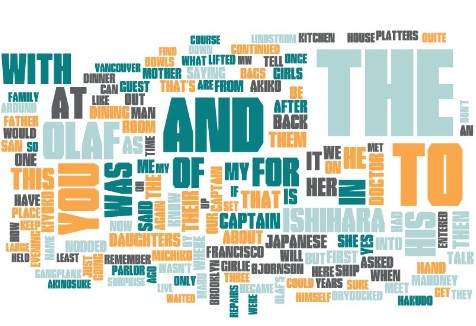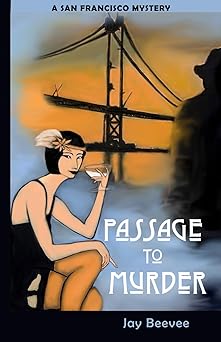
The new version of Passage to Murder is now available on Amazon. I’d love to see your comments below. Can you guess the character I wrote?

The new version of Passage to Murder is now available on Amazon. I’d love to see your comments below. Can you guess the character I wrote?
I’m embarrassed to say Passage to Murder has errors. it seems the corrections we requested in our proof copy created more issues when it was reformatted. If you happen to have a copy, skip chapter 7. The last five paragraphs of chapter 7 belong at the end of chapter 16.
Lesson learned: next time review the corrected proof before publishing.
My apologies if you already ordered.

It was nearly a year ago when eight members of the California Writers Club met to begin collaborating on Passage to Murder. We called our group the “Joint Book Venture,” hence the author’s name, Jay BeeVee.
How can eight authors write one book, you ask? The answer is complicated and a great topic for discussion at book signings and book club meetings. If you’re interested meeting the authors and live in the SF Bay Area, let me know. I hope you get as much joy reading this as we did creating it.
Myrtle is feeling old and doesn’t trust Herman to write her obituary. So she turned to AI. Now she wonders, is AI following her Instagram?

It is with heavy hearts that we announce the passing of Myrtle, a passionate and adventurous individual who touched the lives of all who knew her. Myrtle was an unpublished writer with a love for words and a talent for storytelling. She poured her heart and soul into every piece she wrote, and her words will continue to inspire and move readers for years to come.
In addition to her love for writing, Myrtle was also an avid outdoors enthusiast. She spent many years climbing mountains and exploring the world, always seeking out new adventures and challenges.
Despite her many accomplishments and passions, Myrtle will be remembered most for her kind and generous spirit. She was always there for her loved ones, offering support and encouragement whenever it was needed.
Myrtle leaves behind a hungry husband, a lonely grandson, and two ferocious cats who will miss her dearly. She will be deeply missed by all who knew her, but her memory will live on in the hearts of those she leaves behind.

I wrote a memoir. Well, I thought it was a memoir. I simply took a couple dozen journal entries I had made over the years, imported them into one document, put them in calendar order and added some chapter titles. Done, I thought.
Peaked by an interest in publishing, the next step was to attend a memoir writing class just to confirm that I had already completed my memoir and it was ready.
We began by making a list of all the turning points in our life and then taking that list and placing every turning point along a mountain shaped curve. Of course, the biggest turning point would dominate the top of that mountain and our resolution would be an easy slide down the other side. My first issue. To my mind, all the chapters stood alone, and no chapter was any bigger of a turn than any of the others. Obviously my book would have more of a wavelike curve – just a bunch of small lessons learned in life. “Wrong,” my instructor commented. “You must come up with a theme.” She told me my homework was to find that common thread and then things would fall into place.
The following week, we all showed up with our themes. Well, everyone else showed up with themes. I was still insistent that my little vignettes were all that was needed. The instructor went on to explain the difference between a memoir and an autobiography. “A memoir has a theme,” she began. She continued, and I swear she was looking directly at me with her next comment, “an autobiography captures your life.” I left the class fearing the next week’s meeting where we would share the first piece of our work.
I picked what I determined to be the best of my chapters, made eight copies to hand out and prepared to read. One by one, my classmates volunteered to read. We all got our chance to offer friendly suggestions, not critiques, after which the instructor came up with her comments. I sat in uncomfortable silence while everyone shared their first chapters, from downright boring to brilliant. I waited until someone made a suggestion that I could agree with and then jumped in with some trivial remark. When I was the only one left to share, I picked up my paper with the confidence that my story would fall somewhere in the middle between boring and brilliant. I read all two pages. Silence. The instructor looked around the room and then at me. “Okay then, it is a well-written piece, but I want to emphasize that you are writing a memoir. It has a theme. It’s about you, not those around you. How did you feel? Show don’t tell.” She went on, but by that time I was too embarrassed to absorb the rest. My homework – come up with a theme, add emotion and bring it back next week.
I signed up for a workshop meant for those who were already in the process of writing their memoirs and was taught by someone with a little more experience. We were to turn in our first 2500 words and she would then walk the group through an honest critique of our work. It turned out we received our work back with a few comments in the margins and some copied excerpts from each document. After a full day’s workshop, I came home with the exact same advice from my first class. Show, don’t tell. Find a theme. Put in some emotion.
I joined a writer’s club and soon became a part of a critique group. Here was my chance to share my work with actual writers, get some authentic advice, and join the ranks of the published. We all brought short pieces to share each week, read them aloud, and offered feedback. All in all, it was a positive experience, but I began to hear some familiar responses. “You are a good writer.” “I can’t believe that happened, but isn’t a memoir supposed to have a theme?” “Shouldn’t it be about you, and not those around you?” “Maybe add a little more emotion here and there.”
As we progressed through our work, I began to hear, “You really need to publish this.” “People need to know.” “It will help someone not feel so all alone.” Bolstered by these new prompts, I was ready to click the “publish” button on Amazon. I ordered five ARCs (advanced reader copies). I found a couple of willing readers and waited for feedback. One person thought I had missed an opportunity and gently told me the book was not a book about me. One didn’t say much but leant it to a friend. One suggested I go into a little more detail about this and that before I look for an agent. I got out my red pen and a couple packets of post-it flags. I ran out of ink and had to buy more post-it notes. I set the book aside. I waited a couple of years, picked up the book, looked at the flags, read through my notes, and thanked God I had not pushed the final publish button… yet.